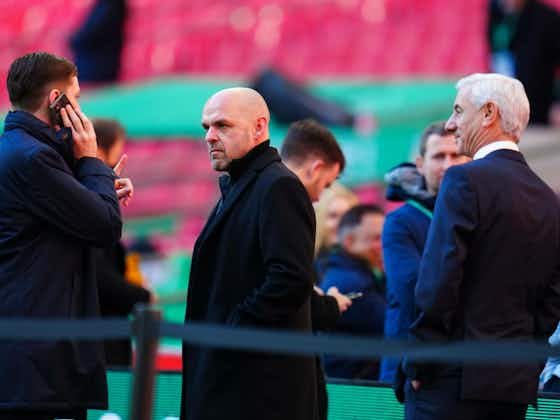Anfield Index
·6 October 2025
‘Salah will come good, he always does’ – Ex-Liverpool Star Reveals Liverpool’s ‘bigger’ issue

In partnership with
Yahoo sportsAnfield Index
·6 October 2025

Mohamed Salah’s influence at Liverpool has long been defined by his devastating impact in attack. Yet, recent performances have prompted debate about whether his limited defensive contribution has become a tactical issue under Arne Slot. Former Liverpool midfielder Danny Murphy believes that while Salah’s freedom to stay high up the pitch is part of what makes him elite, it’s also creating structural problems when the Reds face stronger opposition.
Speaking after Liverpool’s 2–1 defeat to Chelsea, Murphy suggested that the Egyptian’s defensive positioning was leaving his right-back exposed. “I can totally understand if Slot has told Salah not to track back,” he explained. “That’s how he’s scored so many goals over the years. But the players behind him aren’t compensating, and that’s creating 2v1s down that side.”
Murphy’s assessment taps into a wider question about Liverpool’s tactical evolution. Slot’s arrival brought an expectation of greater control and positional discipline. Yet, as the team transitions to his system, the balance between attack and defence — particularly on the right flank — appears unsettled.
Murphy highlighted a clear tactical imbalance in Liverpool’s setup. Whether it’s Jeremie Frimpong, Conor Bradley, or even Dominik Szoboszlai filling in wide areas, the right-hand side has been a recurring point of vulnerability. Chelsea exploited this ruthlessly, repeatedly targeting the space behind Salah to create overloads.
Against top-tier opposition, Murphy argues, Liverpool’s midfield and full-backs need to adjust faster. “When you’re facing teams like Chelsea, they’ll always find those spaces if your midfield support arrives too late,” he said. The issue isn’t necessarily Salah’s discipline — rather, it’s how the players behind him react to his advanced role.

Mo Salah
Tactically, Slot seems to have granted Salah licence to conserve energy for transitions, much as Jürgen Klopp once did. Yet, that trade-off comes with risk. When Liverpool dominate possession, Salah’s advanced positioning is a weapon. When they’re pinned back, it becomes a liability — stretching the structure and leaving gaps that clever teams can exploit.Control Lost and Rhythm Disrupted
Murphy’s analysis extends beyond individual responsibility. He believes Liverpool’s current struggles reflect a broader lack of control compared to last season. “It’s not as if Salah has changed his role,” he noted. “But when he’s not scoring, the defensive side of his game is magnified. The bigger issue is that Liverpool aren’t managing games like they were.”
Slot’s Liverpool were initially praised for their composure and shape. However, a run of poor results — including consecutive defeats in the Premier League and Champions League — has exposed the team’s fragility. “The last half-hour against Chelsea was so frenetic it felt like a cup tie,” Murphy said. “They had chances to win it but gave away just as many.”
Personnel changes and a disrupted pre-season haven’t helped. With new signings integrating and key players such as Alexander Isak and Alexis Mac Allister still regaining sharpness, Liverpool’s cohesion is a work in progress. Where Klopp’s teams once thrived on organised chaos, Slot’s philosophy depends on structured possession — and that requires both patience and fitness to execute properly.
Despite recent setbacks, Murphy doesn’t believe the situation is alarming. “This isn’t unresolvable,” he insisted. “Liverpool just need to rediscover patience and composure. They don’t need to change the whole system.”
There’s optimism in the data. Liverpool remain just a point off Arsenal at the top, and the expected return to peak condition for players who missed full pre-season should sharpen their performances. Building chemistry between key combinations — such as the right-back and Salah, or Florian Wirtz and Isak — will be central to restoring balance.
Murphy’s conclusion is pragmatic. “The physical sharpness will come, and with it, better control of games,” he said. “Liverpool are still in a strong position — it’s just about tightening details.”
For Slot, that tightening may involve subtle tactical recalibrations rather than sweeping changes. Allowing Salah the freedom to remain forward is essential to preserving his threat. But ensuring the team structure compensates — through quicker midfield cover, smarter positioning, and clearer communication — will determine whether Liverpool can sustain a title challenge.
Murphy’s analysis serves as a reminder that even the best systems require balance. Salah’s brilliance remains undiminished, but his role in Slot’s evolving setup symbolises a familiar dilemma for elite managers: how to maximise attacking potential without compromising defensive stability.
As the season unfolds, Liverpool’s right flank — so often the source of both their greatest goals and their greatest vulnerabilities — may once again define their success.






























































